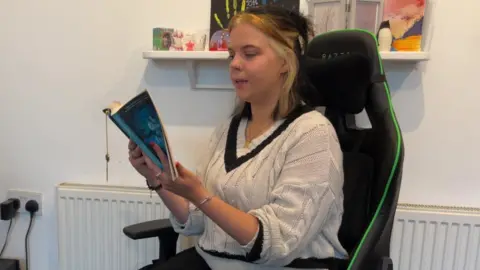'I quit my job because of endometriosis ignorance'
 BBC
BBCA work charter is being created to help support staff who suffer with endometriosis.
It is also hoped employers will sign up to the charter in Hull and East Yorkshire and gain a greater understanding about the medical condition.
Endometriosis can cause heavy periods, nausea, extreme tiredness and chronic pain and, in some cases, people have had to leave their job.
Sarah Ashcroft, from Hull, has lived with the condition for 15 years and said “on the worst days it can be a struggle to get out of bed when you’re in pain”.
Uncomfortable
According to Endometriosis UK, it affects one in 10 women in the UK and costs the economy £8.2bn a year in treatment, loss of work and healthcare costs.
Businesses can sign up and be a part of the national charity's Endometriosis Friendly Employer Scheme.
However, MP Emma Hardy, local support group HEY Endo and the Hull and District Trades Council (HDTC) have come together to create a local charter that allows workers to access more support free of charge.
The aim is to launch the charter by the end of 2024.
Ms Ashcroft shared her story of how she felt she had to leave a previous job due to the lack of understanding from her manager at the time about her condition.
She says she informed her boss ahead of shift that her period had started and that she would need to use the toilet every hour.
However, she says she was left alone in her public-serving role for three hours during which time heavy bleeding had left her in an uncomfortable position.

“I know I’ve bled through at this point but I couldn’t leave,” she said. “I told the manager that I needed to go home to change because I wasn’t comfortable knowing I’d bled through my clothes.
“I was told I had 15 minutes to do this.”
Unable to go home, change and return to work in that time, Ms Ashcroft then made a decision she had never done before.
“I walked out of my job and I felt awful because I’d never left a job before.”
Kath Oliver, president of HDTC, said more than 50% of people with the condition are concerned about the impact it has on their job.
“They have to take time off, they’re concerned about discussing it, there’s a real embarrassment,” she said.
“There is a total lack of knowledge of the symptoms. People often think about it as being ‘those people with heavy periods’, but it’s so much bigger and so much more than that.”
Listen to highlights from Hull and East Yorkshire on BBC Sounds, watch the latest episode of Look North or tell us about a story you think we should be covering here.
